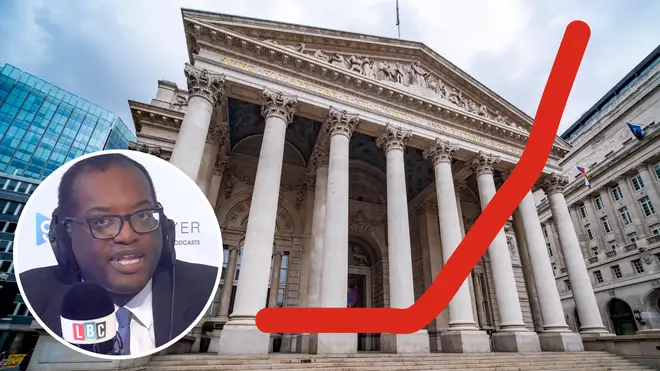
Henry Riley 7pm - 10pm
3 October 2022, 09:57 | Updated: 3 October 2022, 10:50

The pound has bounced back overnight after a U-turn on Kwasi Kwarteng’s plan to abolish the top rate of income tax.
The chancellor’s decision to axe the 45p tax rate saw the pound fall to an all-time low of 1.03 US dollars.
But last night, sterling surged to 1.13US dollars at one stage, recovering ground lost in the market when the controversial mini-budget was announced.
This morning it pared back some of the gains, trading at 1.12US dollars.
Speaking on LBC's Nick Ferrari at Breakfast, just after the statement was made, the Chancellor was asked three times if he planned any other U-turns but he wouldn't confirm.
"I've said what I've said about the 45p rate and I'm totally focused on delivering the growth plan, on delivering the energy intervention or making sure that the 1p reduction in the basic rate continues.
"And we're totally focused on the growth plan."
The Bank of England was forced to step in last week launching an emergency UK Government bond-buying programme to stave off a "material risk to UK financial stability".
It said it will buy Government bonds - known as gilts - at an "urgent pace" after fears over the Government's economic policies sent the pound tumbling and some pension funds on the brink of collapse.
READ MORE: Kwarteng fails to rule out further U-turns after humiliating 45p tax cut reversal
READ MORE: Another 300 mortgage deals pulled of market and 40% of deals have disappeared since mini-budget
But the FTSE index remained under pressure, falling nearly 1% after opening this morning.
George Lagarias, chief economist at Mazars, said: "The Chancellor's forced U-turn should take some pressure off the pound, for the time being. "Still, the UK has lost some credibility with international markets over the past few years.
"Despite the pound's currency reserve status, British risk assets have a long and difficult way before they return as a staple in the portfolios of international long-term investors."
The pound is also still down by 17% since the start of the year, adding the cost-of-living crisis by making it more expensive to import goods and services.